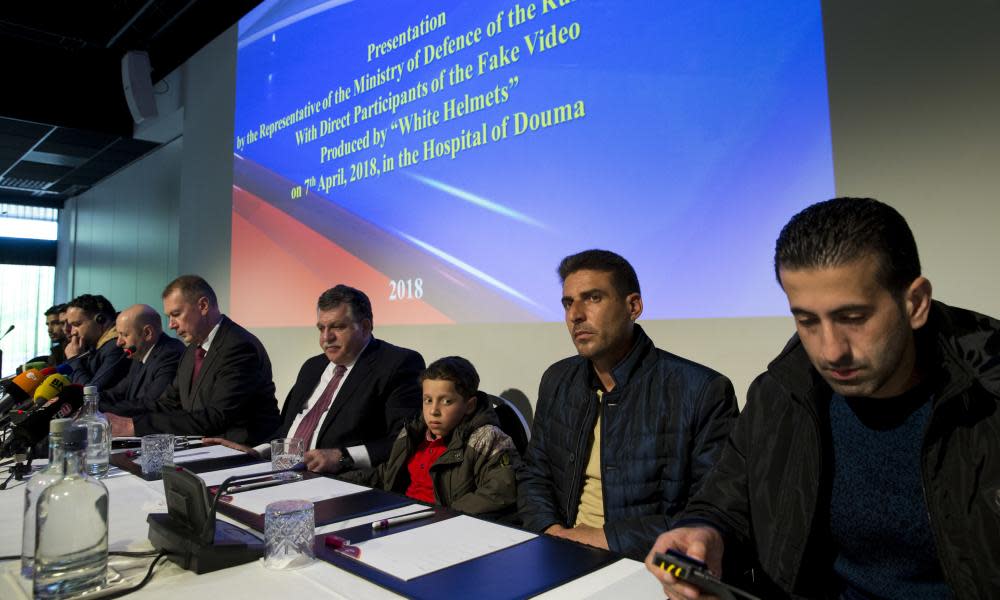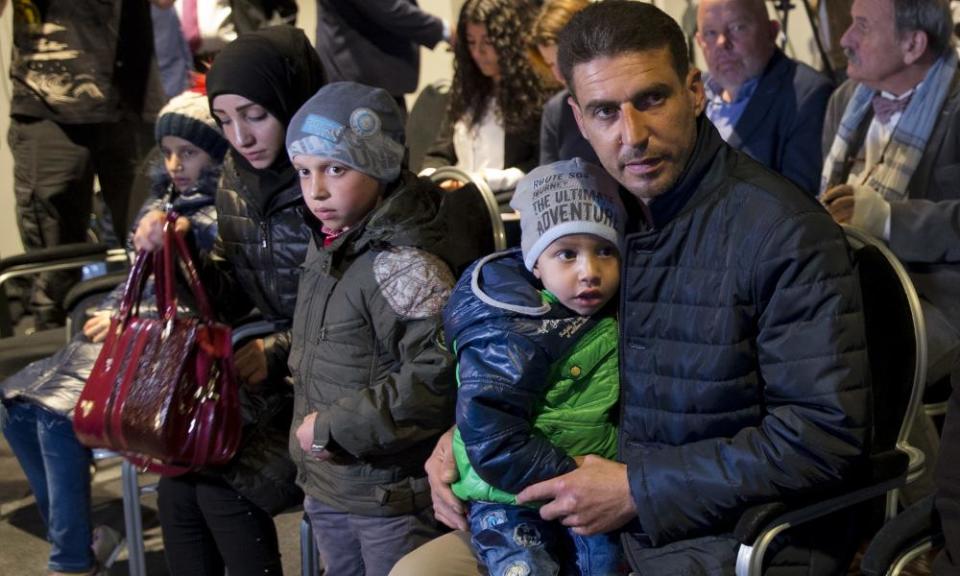'Obscene masquerade': Russia criticised over Douma chemical attack denial

Russia has been accused of carrying out an “obscene masquerade” for transporting 17 Syrian people to Europe to assert that no chemical weapons attack occurred in the town of Douma earlier this month.
The supposed witnesses were unveiled by Russia at the headquarters of the Organisation for the Prohibition of Chemical Weapons (OPCW) in The Hague in an attempt to discredit western claims that Bashar al-Assad’s Syrian regime mounted the chemical attack on 7 April.
The US, UK and France launched a cruise missile strike at three alleged Syrian chemical weapons sites in retaliation for the Douma attack, bringing relations between the west and Russia to its worst point since the height of the cold war.
At an hour-long briefing on Thursday, a succession of Douma residents, including medical staff from the town’s only hospital, insisted there was no chemical attack, but that some people in a state of near hysteria had mistaken breathing difficulties caused by smoke as being caused by a chemical weapons attack.
Surrounded by Syrian and Russian officials, the doctors and paramedics in the group largely suggested that victims arriving at the hospital claiming to have suffered a chemical attack had, after checks, emerged to have suffered no such thing.
Alexander Shulgin, the Russian envoy to the OPCW, claimed that videos of the attack were little more than “a sloppily staged video showing the pretence for a strike is completely groundless”.
Russia has previously said that the attacks were faked on social media by the Syrian civil defence force, the White Helmets.
Aid workers and medics have told the Guardian and others that victims of the Douma attack exhibited symptoms consistent with a toxic gas attack.

OPCW weapons inspectors have visited two sites to take away samples for inspection at designated forensic laboratories. Their admittance to the town, which is under the joint control of Russia and the Syrian regime, was repeatedly delayed, raising fears of evidence tampering. It may be a month before their findings are published.
The veracity the statements by the Russian-selected witnesses at The Hague will be challenged, since their ability to speak truthfully is limited.
The UK’s OPCW envoy, Peter Wilson, said any witnesses should be interviewed by OPCW investigators. Britain and its allies did not attend the Russian briefing, he said, adding: “The OPCW is not a theatre”.
The French envoy Philippe Lalliot said: “This obscene masquerade does not come as a surprise from the Syrian government, which has massacred and gassed its own people for the last seven years.”
The Russian stance and western response is a further sign that the OPCW is struggling to retain confidence of all sides. Russia has already refused to accept an OPCW finding that nerve agents were found at the site of the attack in Salisbury on the Russian double agent Sergei Skripal.
The OPCW team only has a power to state if traces of chemical weapons were found, but not to apportion responsibility.
The latest OPCW dispute came as the UN’s special envoy for Syria, Staffan De Mistura, warned that events in May – believed to be a reference to America’s potential withdrawal from the Iran nuclear deal - could spill over into his efforts to revive a near defunct peace process in Syria.
De Mistura told BBC Radio 4’s Today that the month of May could be very dangerous for Syria because Israel and Iran regarded it as their playground.
Behind the scenes, high level diplomatic initiatives were under way, he said, because Russia and the US had looked into the abyss of a potential conflict in Syria over chemical weapons and drawn back.
Donald Trump has until 15 May to decide whether to renew sanctions against Iran, and kill the nuclear deal, which would create a huge new source of instability across the Middle East. Iranian-backed militias are active inside Syria and Israel has been increasingly willing to see the Iranian barracks as a target for Israeli airstrikes.

 Yahoo News
Yahoo News 